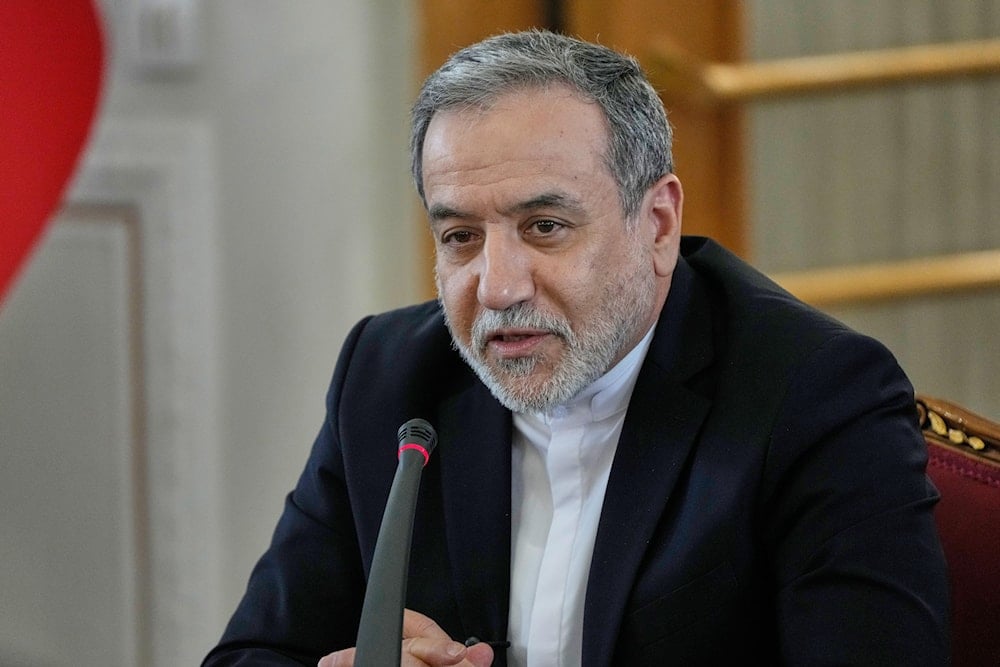Iran rejects talks under excessive US demands, slams snapback claims
Iran’s Foreign Ministry rejects further nuclear talks with the US, citing excessive demands and false claims over the JCPOA snapback mechanism.
-

Iranian Foreign Minister Abbas Araghchi speaks in a meeting with ambassadors and representatives of foreign countries in Tehran, Iran, Sunday, Oct. 5, 2025 (AP)
Iranian Foreign Minister Abbas Araghchi said the country would not return to the negotiating table as long as the United States continued its policy of making excessive demands and persisted in insisting on irrational requests.
Speaking to reporters upon arriving in Mashhad on Wednesday, Araghchi stated that the previous rounds of talks with the US had come to a halt and failed to proceed because of the American side's excessive demands.
In a September 23 address, Sayyed Ali Khamenei elaborated on the futility of negotiating with the US, stating that Washington predetermines the outcome to force an end to Iran's domestic nuclear enrichment.
He equated holding such talks with accepting American coercion, citing a recent US official's demand that Iran should not even possess medium-range missiles, which he interpreted as an attempt to leave the country defenseless and unable to respond to an attack.
Snapback mechanism claims are false: Baghaei
Meanwhile, Iranian Foreign Ministry spokesperson Esmaeil Baghaei stated that many of the claims made by Wendy Sherman regarding the snapback mechanism were false, while speaking to students at Razavi University of Islamic Sciences in Mashhad on Wednesday,
Wendy Ruth Sherman, a senior US nuclear negotiator during the JCPOA talks, wrote in her memoir titled Fear Is Failure: Lessons on Courage, Power, and Persistence that the inclusion of the so-called snapback mechanism, which refers to the reinstatement of UN sanctions against Iran, was one of the final and most difficult parts of the negotiations.
Baghaei dismissed the claim by stating that "the text of the JCPOA is clear and straightforward," rejecting assertions that Iran had been warned about the snapback mechanism. The Iranian diplomat also said that mutual distrust existed during the JCPOA negotiations.
"The other side did not trust us, and we did not trust them either," he added.
The Iranian spokesperson further stated that "some claim that the snapback mechanism was imposed on us, but that is completely untrue" and explained that Iran's guarantee was its own nuclear assets, while the other side wanted assurances that the resolutions could be reinstated if Iran violated its commitments.
Baghaei stated that Iran had fulfilled its JCPOA obligations in good faith but was met with bad faith from the other party.
Resolution 2231 has expired: Baghaei
The Foreign Ministry spokesperson emphasized that Resolution 2231 has effectively ended based on legal and logical reasoning, but Western parties insist on keeping it in force, a position that is opposed by two permanent members of the UN Security Council and countries of the Non-Aligned Movement, which he said demonstrates the importance and greatness of Iran and its diplomatic capabilities.
Baghaei further condemned the US approach, characterizing its bullying behavior as disruptive to international relations and suggesting its Department of Defense should be renamed the "Department of War" to better reflect its true conduct.
He added that America's aggressive unilateralism endangers international peace and security by fostering a dangerous pattern in global relations, arguing that Washington uses various means, including tariff wars, to impose its dominance through coercion.

 3 Min Read
3 Min Read








